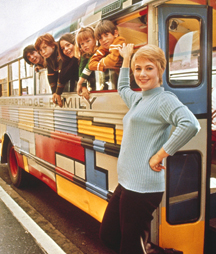
Early publicity photo
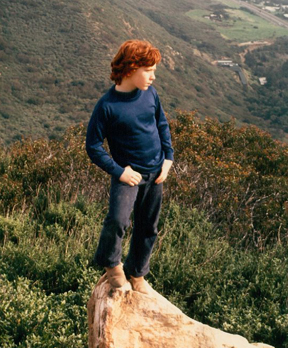
Danny at Dave's Malibu home
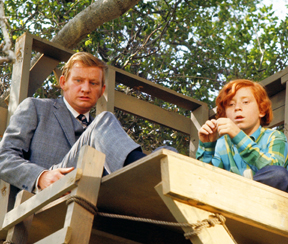
"Star Quality"
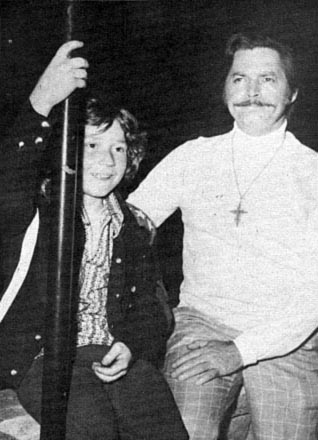
Danny with his father
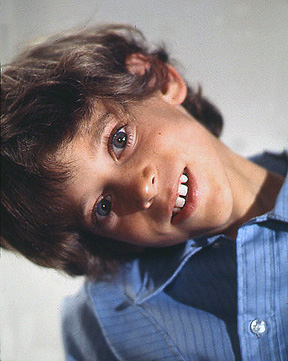
Jeremy Gelbwaks
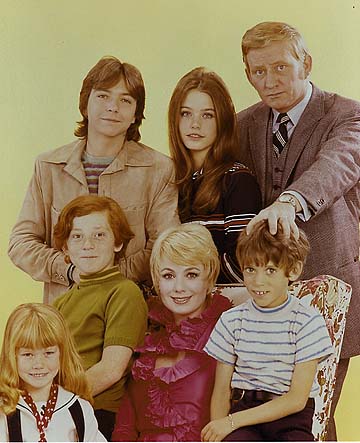
The cast with Jeremy
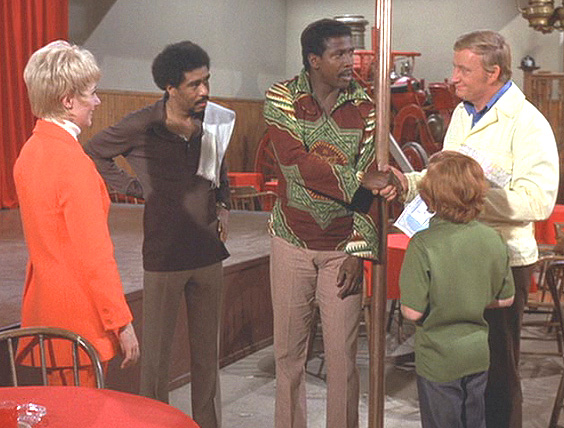
"Soul Club"
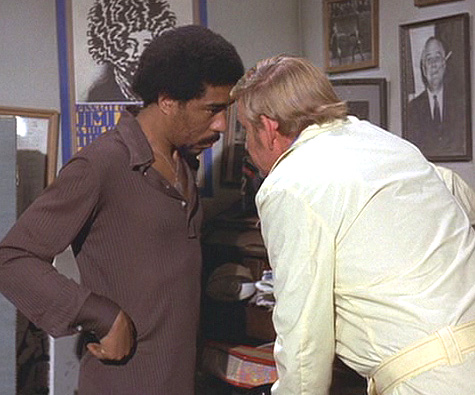
Dave with Richard Pryor
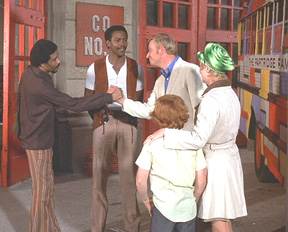
With Lou Gossett Jr. and Richard Pryor
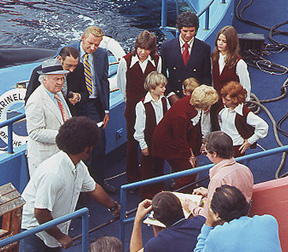
At Marineland
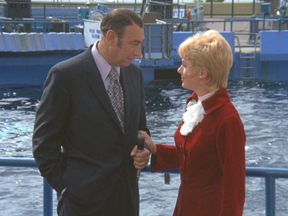
Shirley with Howard Cossell
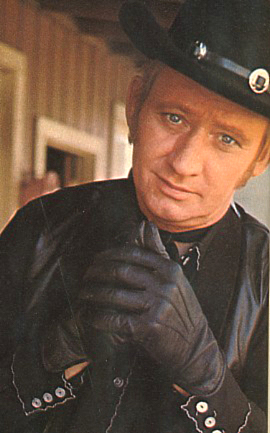
Mean Sidney
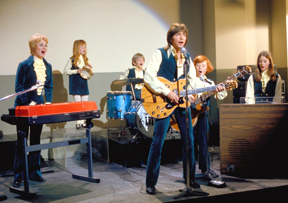
Music Day

Continued:
GH: What was the scene?
DM: Well, there was a scene where I went to the Partridge house to talk Shirley into letting us produce the album and record. You can' t sign the kids of course you had to sign the mother. Kids can' t sign contracts. So the mother had to sign the contract to allow all that to happen. Like I said, they ran out of time so they had to cut that scene. GH: Was it cut before it was filmed? DM: No, they shot the scene. You know, it's funny. There are shows, where I've seen scenes from The Partridge Family, and watched myself, and do not have any recollection of doing it. No recollection of seeing these people, saying these words - nothing. I don' t know why or how that happens, but if it happens with me, you can imagine what happens with kids. There has to be blank spots in their lives relative to that show because - heck - I was in my late 30s and if I can' t remember doing something, there must be a lot that they can' t either. Of course, then there' s Danny - however -- who seems to remember things that never happened. GH: Such as? DM: The "fact" that I taught him how to smoke, the "fact" that when he came out to the beach house that he learned how to drink at my cocktail parties. My cocktail parties? Now I' m a guy that has never drank his entire life. I never had a cocktail party. I never even had more than four people out at the beach house at any one given time, and yet he "remembers" going around and finishing the drinks at cocktail parties at the beach house. That' s madness. Either he misremembers, or he makes things up. I never figured out which. GH: My guess is he makes them up. DM: I think so too. I just wish he wouldn' t make them up to make me look bad. Like teaching him to smoke and drink? That' s terrible! GH: Did you have this beach house in DM: Oh sure. Danny spent a lot of weekends out there. GH: When did you realize that Danny had problems at home?
DM: Well, Danny' s mother came up to me and told me about the problems Danny was having with his father and she didn' t like him being there on the weekends when his father was there. His father was not too kind to him, apparently, so she asked me if he could - at times -- spend the weekends with me at the beach house. So I said, "Sure, I' d be happy to." Oddly enough, today - if I were to do that and the press would have gotten wind of it; I' d probably be in prison!
GH: Or on Jerry Springer!
DM: Yes! Just because I was allowing a kid to spend the weekends with me would be enormously suspect in today' s society. They' d probably make a lot out of it especially since I was a bachelor. Of course, I probably wouldn' t have done it because I would have been aware of the pitfalls of such a thing and I would have said. "No." But yeah, he spent a lot of time out there.
GH: What you remember about Jeremy Gelbwaks? DM: Jeremy? Jeremy was funny. He was very anxious to please and do whatever he could. I wrote in my book that we would do scenes and just before we' d start to shoot he' d ask the Director, "What voice do you want me to use?" And it just broke us up because for one, he said so little that he could have spoke like Donald Duck and nobody would have noticed. But the point is, he didn' t have any voices. He wasn' t a voice person. So nobody knew what he meant. And of course, there were the fights between he and Danny, usually generated by Jeremy who shouldn' t have done it because he was much smaller than Danny. And he would do things like, standing in a scene and before they' d yell "action," he' d kick Danny in the shins because he figured he' d get a reaction and Danny wouldn' t be able to do anything. Well, he should have known that wasn' t going to stop Danny, and Danny would just punch him out. He didn' t give a damn if the Director said "action" or not, he' d just nail him. And then that would start a fight and the mothers would put down their knitting and they' d all come onto the set to mediate this thing and I' d walk off the soundstage and have a cigarette till it was over because I really didn' t want to get involved. And obviously it had to work in Danny' s favor and against Jeremy' s position because Danny was becoming one of the stars of the show and Jeremy wasn' t. So when they figured they had to get rid of somebody, it wasn' t going to be Danny, it was going to be Jeremy. GH: So it was a conscious decision of the part of the Producers to get rid of Jeremy, as opposed to the stories we' ve heard that Jeremy' s family relocated? DM: Oh sure. I' m not sure if Jeremy' s family actually did relocate. I' m not sure that wasn' t a story that was just made up because I literally didn' t see Jeremy again for years and years. He was an adult when I saw him next. So, I really don' t know. I think the story was his father was relocated to GH: Reuben booked The Partridge Family into a club in DM: Well, I knew Lou Gossett already because he did a series that only lasted a few months called "The Young Rebels." They filmed it on the same lot as us. So I got to know him a little bit back then. It was about the Revolutionary War. I had known Dick Pryor a little bit too because I had done stand-up comedy and I had met him before too. I had fun on that show. That was another one of those shows that I felt was utilizing the concept. The only thing that was a little disturbing to me is that Pryor was in the habit of not sticking to the script. He loved to just ad-lib the scene and say what he felt like saying. Which is alright except if you have to take cues, if you have a line that comes off of one his lines, you have to know when he' s going to finish. Maybe you don' t have to know exactly what he' s going to say but you have to know when he' s going to finish, or you' re going to be standing there waiting for him to say something. They didn' t seem to mind him doing that.
GH: Was Richard Pryor a big name in 1970? DM: Not a big name, no. He was known for his stand up and a little bit of television but I don' t think he would have been considered a big name.
GH: You wonder why they let him ad-lib like that? DM: I don' t know but the first time that they ever said anything to me about not saying my lines, I stopped everything and said, "Now hold it." I said, "You want me to say my lines. I know my lines. And I know when I' m supposed to say it. And I' m supposed to say it as soon as he finishes saying, 'so-and-so.' Now if you' re going to let him say anything he wants, then you better get somebody off-stage to throw me a cue as to when he' s finished because I' m not going to start talking while he' s still ad-libbing." So I had to get that settled real quick, because they weren' t going to start blaming me for his ad-libbing. That didn' t make any sense. But anyway, we had fun. It was fun working with Pryor.
GH: When the Second Season started, your 'prison cell' must have that much smaller now that the show was a huge smash hit? DM: Oh, yeah, yes it was.
GH: The beach house must have been a nice refuge from the craziness, then?
DM: Well, even after "The Partridge Family" was over and I had got married and had children. Now we' re going into the late 70' s/early 80s. I was taking my kids to GH: Sure - but now the reruns are on 5 days a week instead of once a week. DM: Right. So in a way I guess you were recognized even quicker.
GH: The Second Season had a lot of memorable episodes, one being "Whatever Happened To Moby Dick," which you filmed at Marineland Of The Pacific in DM: Howard Cosell was standing with me near the whale tank one day waiting to shoot and he says, "What in the hell am I doing here?" I said, "I was wondering the same thing, Howard. This isn' t exactly your venue. I have to assume they are paying you good money and that' s why you' re here." And Howard said, "That' s right - it' s the money." I enjoyed meeting him. GH: Was it more difficult for the cast to film on location like this as opposed to the security of the Ranch? DM: It wasn' t difficult in Marineland. We had a hotel right near Marineland so there wasn' t any problem. However, the episode we did in GH: Gee, if it were filmed today, you' d be afraid for your own safety. DM: Well, I didn' t worry about my safety - I figured if they were going to kill anybody, they' d kill David first. (Laughs) I wasn' t worried about it from that point of view. It was the restriction and not being able to go anywhere or do anything except wait to do these scenes. That' s what bothered me. GH: In talking with other cast and crewmembers, everyone' s favorite episode seems to be the second season Christmas episode, "Don' t Bring Your Guns To Town, Santa." DM: Oh, well sure, the reason being you got to play somebody other than your characters. I got to play Mean Sidney, the gun fighter. That' s always a lot of fun when you' re being Reuben Kincaid week in and week out, and you suddenly get to play something different. Dream sequences are fun. We had a dream sequence in " GH: I hope you enjoyed The Partridge Family' s music - because nine times out of 10, Reuben is in the audience while the family is performing. How was filming on music day for you? DM: I enjoyed most of the Partridge music because it wasn' t heavy rock. It was, what they called back in that era, bubblegum rock. It was much more pleasing to the ears than a lot of the rock that came after, that' s for sure. But that was the year of Sonny & Cher, and I liked them too.